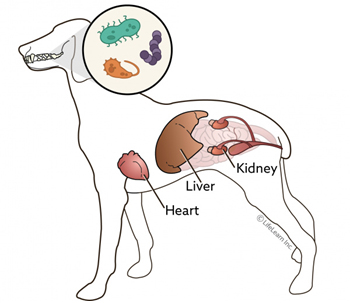While the American Veterinary Medical Association (AVMA) celebrates National Pet Dental Health Month each February, dental health should be a regular ritual for pet owners all year long. Dental disease, also known as periodontal disease, is a condition in which the tissues supporting the teeth become inflamed. In its most mild form, periodontal disease is associated with gingivitis, or inflammation of the gums. In more severe cases, it can manifest as tooth root abscesses, bone infection of the jaw, or as a pathologic (disease-induced) fracture of the jaw.
Dr. Chris, DVM, explains, “When a pet develops dental disease, significant quantities of bacteria reside within the mouth and the oral tissues. These bacteria can enter the bloodstream and travel to other areas within the body, causing distant or systemic effects.” There are three organs that are especially susceptible to the spread of oral bacteria: the heart, the liver, and the kidneys.

Oral Bacteria can enter the bloodstream and affect distant organs such as the heart, liver and kidneys.
The bacteria that are found within the mouth of pets with dental disease are the same bacteria that are often implicated in heart disease. These bacteria are associated with both endocarditis (inflammation/infection of the interior of the heart) and valvular disease in dogs and cats. Additionally, the presence of periodontal disease has been linked to an increased risk of heart disease in dogs.
“The liver and kidneys are especially susceptible to the effects of dental disease,” says Dr. Chris. Both organs function primarily to filter the blood, which allows bacteria from the oral cavity to easily spread to each of these organs. Infection and inflammation within the liver and kidneys can cause signs of systemic infection (such as fever, weight loss, and decreased appetite), while also interfering with the function of these organs.
Screening for Systemic Disease
Harmony Veterinary Center uses a number of tools to screen for dental disease, including physical examination. A pet with heart disease may have a detectable murmur that can be heard with a stethoscope. A pet with liver or kidney disease may have visible weight loss or pain on palpation of the abdomen.
In addition says Dr. Chris, blood tests, including a complete blood count (CBC) and serum biochemistry, can assess a number of different liver and kidney function markers. Elevations in these values may suggest the presence of liver or kidney disease.
If the results of a physical examination or blood tests suggest the presence of underlying disease, we may recommend additional diagnostic tests. If your pet has signs of heart disease, for example, your veterinarian may perform chest X-rays to look for heart enlargement and signs of heart failure. If your pet has signs of liver or kidney disease, your veterinarian may recommend additional blood or urine testing.
Minimizing the Effects of Dental Disease
The best way to minimize the systemic damage associated with dental disease is to proactively prevent and treat dental disease. Dental conditions should be addressed as early as possible to minimize the risk of worsening and spread. There are two components to dental care: home care and veterinary dental care.
- Home careconsists of brushing your pet’s teeth regularly. If you are unable to perform regular brushing, your veterinarian can provide alternatives such as an oral rinse or medicated dental chews.
- Veterinary dental care, also referred to as a comprehensive oral health assessment and treatment, is performed under general anesthesia. Your pet will be anesthetized, using a combination of injectable and inhalant anesthetics. First, the tartar will be scaled off. Then, X-rays will be performed to evaluate the tooth roots and other tissues below the gumline. Once your pet’s teeth are clean and visible, we perform a thorough oral exam and devise a treatment plan for any dental issues that have been discovered. These treatments may include extractions or more advanced dental procedures.
In some cases, if your pet is experiencing systemic signs associated with dental disease, antibiotics may be recommended to minimize the quantity of bacteria in your pet’s mouth and bloodstream. In many cases, antibiotics are started prior to a dental procedure. It is important to note however, that antibiotics alone are not sufficient to treat dental disease or its systemic effects. Antibiotics are intended only as an adjunct to more definitive treatment.
A consistent home care regimen combined with regular checkups and cleanings with your veterinarian can minimize and even reverse dental disease in your pet. By taking these steps, you can avoid major damage and painful infections, while increasing quality of life and avoiding high veterinary costs in the future.



